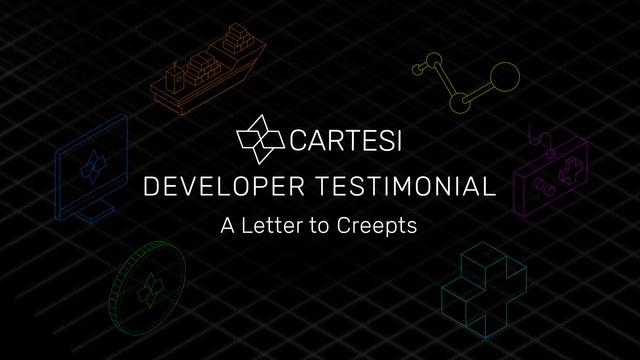
Trailblazing the rebirth of peer-to-peer computing as Decentralized Applications.
Hi!
My name is Fabiana, and I have been recently hired as a Software Engineer for the Cartesi Team. I hold a Computer Science PhD in Distributed Systems, having specialized in cheat-proofing massively-multiplayer online games. I joined Cartesi in December 2019 and, at the time of this writing, I have been in the company for 45 days.
Let me tell you, what a ride it has been so far! I have learned so many new things. I don’t remember ever having learned that much about software development in such a short span of time!
Cartesi’s current internal project, about to be released, is called Creepts. Creepts is a browser-based and blockchain-based, decentralized Tower Defense game tournament that is powered by Cartesi.
And it is a tour de force in software engineering. That is, the implementation and the release of Creepts, in such a short span of time, are amazing feats.
The Creepts project is truly remarkable. I am incredibly lucky to be able to witness how such an incredibly talented software development team has managed to pull it off.
The development of massively multiplayer online games, that is, interactive virtual worlds that support arbitrary numbers of pseudonymous participants, is already a pretty difficult task. I know it because I have built prototypes and studied these beasts for a couple of decades now.
On-line, interactive virtual worlds that support arbitrary numbers of participants in competitive disputes that require anti-cheating measures exercise multiple dimensions of software design and engineering. Those dimensions affect not only the realm of code but also the team setting where time is of the essence to get things done, which is already pretty hard! Let’s also not forget about our audience, the gamers themselves, which are a pretty demanding, unpredictable, and hard-to-please bunch!
The scientific research on massively multiplayer online games (MMOs), for decades, has not come up with a general solution for cheat-proofing them across most attack vectors and across most game genres, let alone across all of the possible combinations of these factors. It is an open problem that, in practice, can only be approached by a combination of expensive and really clever research, and tricky specialization — by carefully choosing what types of games you will attempt to create, and using what technology to implement them. That difficulty adds up with the rest of the implementation burden, which for any sort of MMO means implementing a distributed system. That is, secure and scalable distributed systems on the Internet are already pretty difficult to engineer without the interactive, creative-entertainment and competitive-economic aspects of the persistent-state virtual worlds we want to support. Each one of these additional requirements multiplies the difficulty of the project as a whole.
But wait. Creepts is not only a prototypical implementation of a massively multiplayer online game as we know them. It is also an experiment in innovation in gaming itself. There exists nothing quite like Creepts — it is a notable achievement in computing.
Creepts is the first computer system in at least two new categories. Creepts is the first Linux-based Layer-2 blockchain-based application, being the first DApp implemented using the Cartesi technology stack. And it is the first blockchain-based, crypto-aware, fully-decentralized and interactive, tower defense game tournament. I may be uninformed of prior attempts, but if there were any, I am sure Creepts still counts as an innovation in both these categories.
Creepts mathematically prevents an entire vector of cheating in a blockchain-enabled, crypto-aware massively multiplayer online game that can be played by an arbitrary number of pseudonymous participants, identified by nothing but their Ethereum wallet addresses. That is not only software engineering — that’s applied science! Creepts is publishable Computer Science research.
Cartesi is not a university research lab, nor even a game company! Imagine what actual game companies will be able to come up with by building with Cartesi? Imagine what exciting research possibilities the Cartesi system will enable?
I am sure that Creepts will be the stuff of legends. It will be, at the very least, for those who witnessed its development and release up close. We will never forget it. As a recent spectator, I am sure that I will always remember it.
I have written this article to share my perception that the Creepts project is an extremely bold undertaking for the Cartesi team. Delivering on such a sophisticated tech demo of an experimental game genre was absolutely not an easy task. But the Cartesi team simply chewed it up like bubble gum, while simultaneously developing a revolutionary Layer-2 technology that supports arbitrary Linux-based code for blockchain DApps. You know, just another day at work!
I am sure that the Creepts project has already helped shape Cartesi, and deliver great insight into the universe of possibilities that lie ahead for the company, for the Cartesi SDK, and for anything else the Cartesi team chooses to create and give to the world. As someone who is still ramping up in the team, I cannot contain my urge to congratulate them and attempt to properly contextualize the magnitude and significance of what they have achieved, from my temporary stance as an outsider.
When I look at Creepts, I see more than a computer game. I see the birth of something great. I see the birth of infinite possibilities. I see not only a “proof of concept,” but a trial-by-fire of a concept. I see something truly worthy of being worked on.
Cartesi will be delivering powerful tools that will be fun to use. So, join us, and lend us your visions and your creativity. Let’s see what completely new things we can create together!
Quick Links:
Website: https://cartesi.io
Telegram Community: https://t.me/cartesiproject
Telegram Announcements: https://t.me/cartesiannouncements
Discord Dev Community: https://discordapp.com/invite/Pt2NrnS
GitHub: https://github.com/cartesi
Social Media:
Twitter: https://twitter.com/cartesiproject
Reddit: https://www.reddit.com/r/cartesi
Facebook: https://www.facebook.com/cartesiproject
LinkedIn: https://www.linkedin.com/company/cartesiproject/
YouTube: https://www.youtube.com/channel/UCJ2As__5GSeP6yPBGPbzSOw